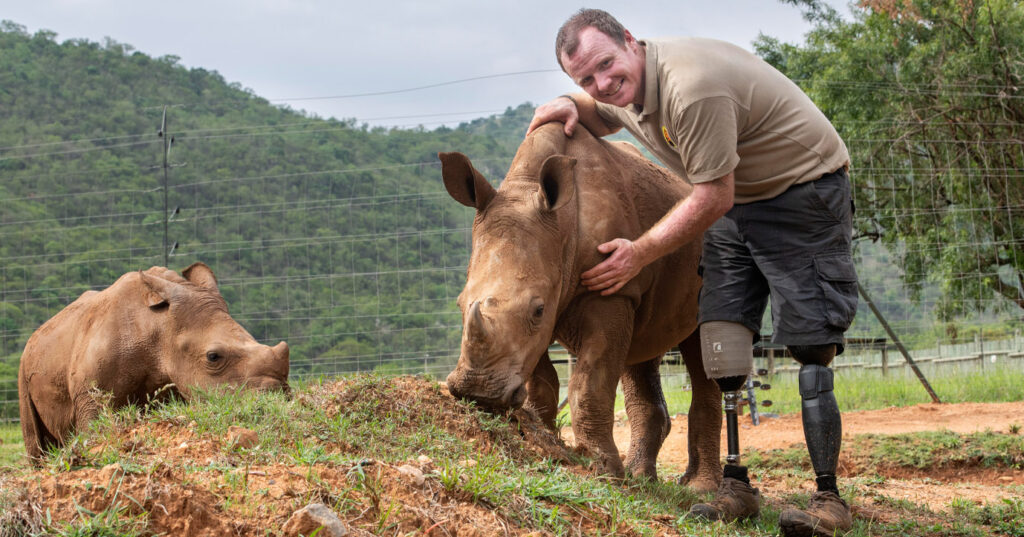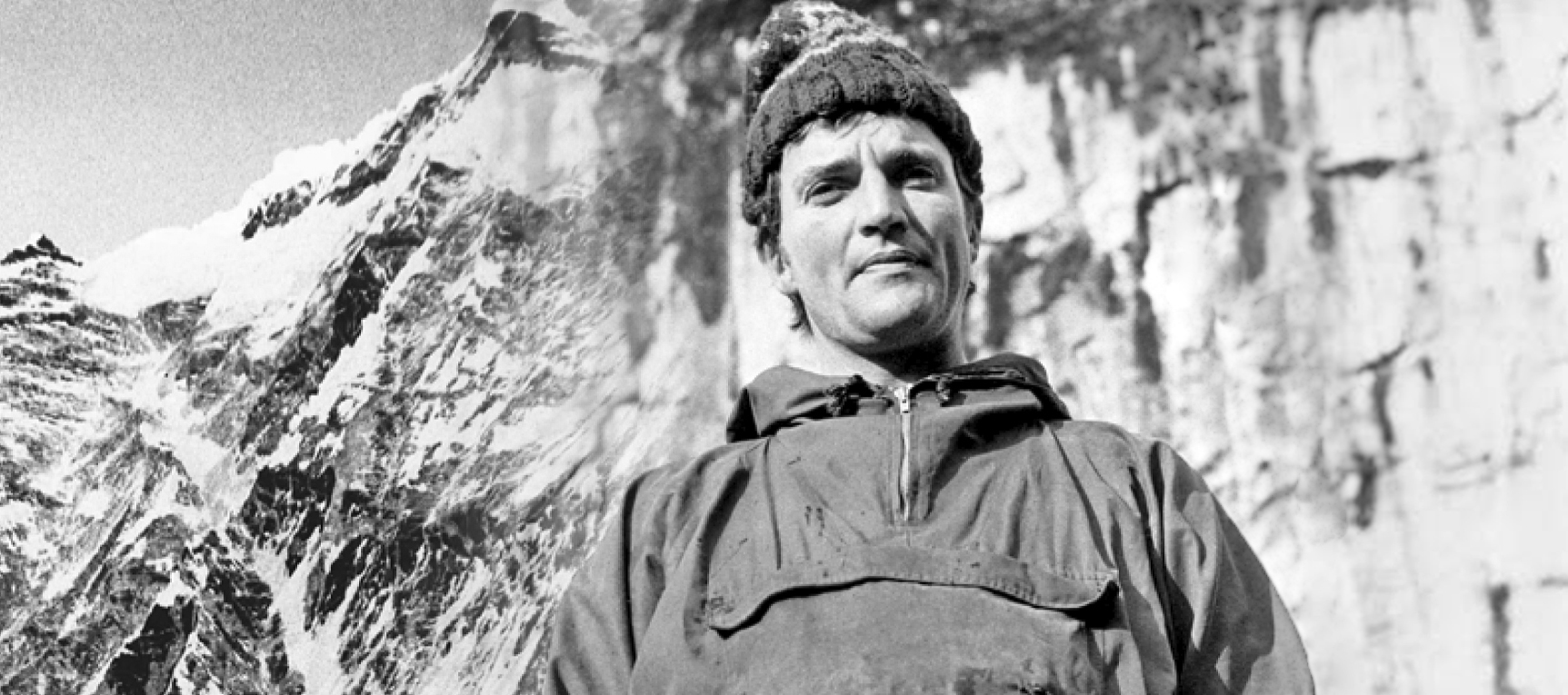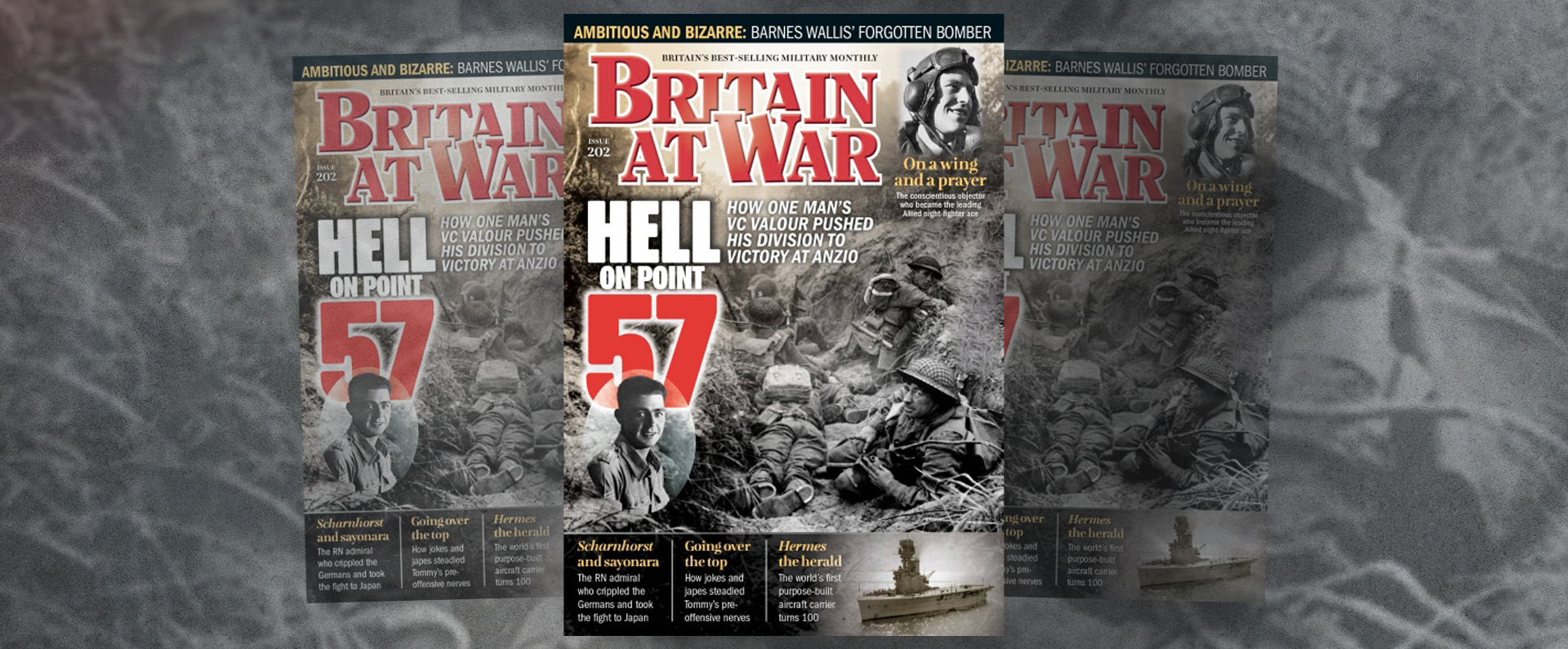
Published in the Telegraph Magazine on 26 January 2019.
Lance Corporal Peter ‘Pete’ Dunning
Corporal Christopher ‘Chris’ Corbett
Corporal Jennifer Yarwood
Sergeant Jennifer Jessey
Craftsman Martin Bodley
Rainbow leans forward and rests her chin on Peter Dunning’s left leg as he sits on a large discarded rubber tyre. The baby rhinoceros then lunges towards the plastic teat of a litre bottle of powdered milk that Dunning is clutching in his right hand.
It is feeding time under the late-afternoon African sun and Rainbow knows it. ‘Come on, gorgeous,’ Dunning says affectionately, but she needs no encouragement as she guzzles down the milk. Dunning reaches forward and gently rubs the thick hide on her neck with his left hand, slowly bringing it higher to tickle her ears.
‘Hey, not my hand!’ he says with a chuckle, as the 82-kilo rhino misses the bottle and mistakenly starts to suck on two of his fingers. ‘That’s it. No more.’ He talks as if she can understand him, lowering his head so that his nose is less than an inch from the animal’s face.
It is a tender and moving scene, all the more so when you learn of the deeply troubled pasts of both man and beast. For the left leg that Rainbow is resting on is, like Dunning’s other one, a prosthetic. Dunning, 33, a military veteran with a broad Scouse accent and a cheeky smile, lost both his legs and suffered other serious injuries when the Viking armoured vehicle in which he was travelling struck an IED (improvised explosive device) while on tour in Afghanistan’s Helmand Province in May 2008.
Meanwhile Rainbow is, at two months old, an orphan, brought in by helicopter a few days before. Her mother was apparently killed by one of the gangs of armed, ruthless and illegal poachers operating across South Africa’s famous Kruger National Park, close to its border with Mozambique.
I say ‘apparently’ because, unlike most young rhinos, she was not found next to her dead or dying mother. (Poachers can’t usually be bothered to butcher a young calf as well as its mother because he or she has little or no horn for them to plunder. Also, they know that the sound of a second shot is more likely to alert rangers or private landowners to their presence.)
Dunning’s feeding of Rainbow was one of the many remarkable and intimate scenes that I witnessed at the Care for Wild Rhino Sanctuary, the largest rhino orphanage in the world. In over 50,000 acres of gently rolling bush, with a staff of more than 50, including armed guards, baby rhinos snooze for up to 10 hours a day in their individual pens – though when they wake they quickly become lively, inquisitive and noisy.
As they grow, these youngsters graduate to larger pens with other rhinos and then, eventually, they are released back into the wild. The sanctuary’s precise whereabouts and the exact number of rhinos in its care cannot be disclosed in case poachers go in search of easy pickings; rhino horn is in such great demand in the Far East that its black-market price has rivalled that of gold or cocaine.
Amid tight security, I was allowed on to the sanctuary late last year. I was there to report on Footprints of Hope, a unique charity project that enables veterans suffering from physical- and mental-health issues to spend two weeks working with the rhinos. The course is organised by Veterans for Wildlife, a British charity that aims to combat wildlife crime globally. It centres around animal-assisted therapy (AAT), a practice that brings animals – horses, dogs and cats, but sometimes wild animals too – and humans together. AAT is used to complement and enhance the benefits of more conventional therapy.
Dunning was one of five veterans on the course, under the supervision of mentor and fellow veteran Alan Ives, who also has specialist knowledge of poaching. The three men and two women, who have left the Armed Forces, all suffer from post-traumatic stress disorder (PTSD). Over a fortnight they carried out the duties of a regular volunteer at the sanctuary, looking after orphaned, abandoned and injured young rhinos, cleaning out pens, digging out their man-made mud baths, feeding them with milk, and providing the animals with company, security and affection.
The veterans were picked from a shortlist by a panel of three, chosen on the basis of who was best-suited given their individual problems and their ambitions for the future. Originally, there were six, but one man, also suffering from PTSD, did not have the confidence to make the trip.
Although initially apprehensive about what lay ahead, the group got to know each other over yoga, art and meditation sessions in London beforehand. It was nearly 8,000 miles away, however, in that remote part of South Africa, that they were finally able to make real progress in rebuilding their lives.
Chris Corbett was one of the veterans. The 31-year-old from Cannock, Staffordshire, who served eight years in the Army, becoming a corporal in the Duke of Lancaster’s Regiment, was injured by shrapnel during a tour of Iraq in May 2007. He struggled with aggression and depression after leaving the military, and was eventually diagnosed with complex PTSD. As the two of us sat on a deck in the shade beside a river that meanders through the sanctuary, Corbett told me, ‘Everyone finds it easier to talk about our traumas here. We’ve all bonded with the rhinos; they each have their own personalities.’
The group – who mainly worked together with three ‘babies’, Rainbow, Summer and Arthur – have also bonded with each other and plan to have a reunion later this year. All are planning to stay in touch with the sanctuary and several plan to return to South Africa, either as mentors on future courses or with their families.
For Jennifer Yarwood, the trip was life-changing, too. The 33-year-old served 14 years in the Army, ending up as a corporal in the Royal Army Veterinary Corps. She did tours of Bosnia, Kosovo, Afghanistan and Iraq as a dog handler and was badly injured during an enemy attack on her third tour of Iraq in March 2008. Yarwood left the Army in 2017 and now walks with the aid of crutches.
She told me how she initially struggled to be around Rainbow, ‘but then I found out, with Jovika’s [the clinical psychologist working with the group] help, that she reminded me of me [because of her vulnerability].
‘I have hidden behind my front door for many years… but just a week into the course, I’m already a different person. I struggled at first because I couldn’t physically help in the way that I wanted to. But Jovika taught me a thought process around: “Don’t look at what you can’t do, look at what you can do.” So I have developed a completely different attitude. It’s changed my life.’
Like all the participants, Yarwood has become passionately anti-poaching . ‘I cannot comprehend how anyone can damage such a vulnerable animal. It infuriates me so much. I wish I could save every single one of them.’
Jennifer Jessey, 28, who served 12 years with the Adjutant General’s Corps (Staff and Personnel Support), during which she did tours of both Afghanistan and Iraq, was diagnosed with PTSD in January 2017. She has been medically discharged and is due officially to leave the Army, in the rank of sergeant, in March this year. Jessey too felt better equipped for the future thanks to the project. ‘It’s scary to think about a new career,’ she said. ‘But I now feel I have the confidence and the tools to move forward: to go out into the world and be OK.’
Like humans, rhinos can suffer from a form of PTSD. Both can become frightened, insecure, vulnerable and in need of outside help as a result of trauma. ‘It’s been interesting learning that animals react in a similar way to human beings,’ said Jessey.
Martin Bodley, 29, believes that the veterans’ difficult pasts made it easier for them to connect with the baby rhinos. ‘When the little one [Rainbow] came in by helicopter and we sat with her, you could feel her breathing: it slowed down,’ he said. ‘All she wanted was for me to be sat next to her. It was something else.’
Bodley, who left the Army in 2012 after seven years, was a craftsman with the Royal Electrical and Mechanical Engineers and completed two tours of Afghanistan. He has since struggled with heavy drinking and depression and was eventually diagnosed with PTSD.
The veterans slept in log cabins and got together with the regular volunteers at mealtimes. Their time at the sanctuary left all of them with special memories, as Dunning, a former Royal Marines Commando, recounted: ‘At one point, we had just fed two of the rhinos and they were in their pens. Straight after having their milk, they went into a “milk coma” and fell asleep. We just stood there watching them sleeping side by side and it was so beautiful, peaceful and relaxing.’
The Footprints of Hope project was masterminded by Veterans for Wildlife CEO Wes Thomson, 30, who served five years with the Royal Marines before working in the security industry. ‘In 2016, the poaching situation was really getting bad,’ he says. ‘At the time, one rhino was being killed every eight hours and one elephant every 15 minutes for their horn and tusks respectively.’
Thomson recognised that ex-servicemen and women are highly skilled and good at working in a team. ‘I realised that veterans with PTSD could do so much good – for both the rhinos and themselves,’ he says. ‘The main aim is to give the veterans coping mechanisms so that, when they go back to the UK, they can use them in their day-to-day lives to deal with their struggles.’
Jovika Wiese, 35, is the clinical psychologist who designed the AAT programme. ‘The veterans have had a lot of stress and anxiety during the period after leaving the military,’ she says. ‘I hope that they all feel calmer and more grounded for coming here, and that the experience will enable them to make lasting changes in their lives.’ Wiese’s role has been to help with the assessment of the candidates before, during and, eventually, after the programme. ‘Having a purpose every morning to get up and to make sure the rhinos are taken care of has created an amazing sense of meaning for the participants,’ she says. Her early analysis – and more will follow – indicates that the group all benefitted from their stay, with signs of ‘symptom reduction’.
This was Veterans for Wildlife’s first Footprints of Hope project and I was the sole sponsor. Two more similar courses are planned for June and December 2019, which will be funded by individual donors, trusts and foundations.
At present, the Care for Wild Rhino Sanctuary typically saves between 10 and 15 young rhinos each year, and the aim is eventually to have a secure area for up to 100. Poachers currently kill just over 1,000 rhinos a year in South Africa alone. With the problem at such a scale, it is not impossible that all rhinos in the wild could be extinct by 2050.
‘We are at a tipping point,’ says Dr Andrew Muir, one of South Africa’s premier conservationists and the CEO of Wilderness Foundation Africa. Black rhino numbers worldwide are down from well over 50,000 50 years ago to under 6,000 today, including more than 2,000 in South Africa. White rhinonumbers are down to about 20,000, with 15,000 in South Africa.
Rhino horn is used for everything from jewellery to ‘medicine’ – it is crushed and drunk for its supposed health benefits (even though there are none). However, the cost of rhino horn on the black market is down by approximately half from its peak of $70,000 per kilo six years ago. Conservationists hope this shows that demand is declining, but there may be other reasons, too. Some believe that gangs have been stockpiling rhino horn for many years and may now be releasing it on to the black market in large quantities, leading to a price fall.
Petronel Nieuwoudt, 49, founded the sanctuary – whose ambassador is the Duke of Sussex – in 2001. She has released nearly 30 rhinos back into the wild, including seven earlier this month. However, she says, she never knows what each day might bring.
‘The things I have seen you can’t believe that humans could do to an animal. Sometimes it’s not a case of humankind but “human-un-kind”. Often the orphans have deep, painful wounds and are traumatised mentally as well.’
One of the young rhinos, nicknamed Lo-Fo – an abbreviation for lost and found – was discovered, desperately weak, seven days after his mother had been killed by poachers. A passer-by saw him cowering beside her dead body and reported it. Another baby rhino was so dehydrated that it was found drinking its own dead mother’s blood.
Nieuwoudt marvels at the effect that caring for the rhinos has had on the veterans. ‘The day Rainbow arrived, they just jumped into gear. They are a real team and have accomplished so much.’
I got behind the Footprints of Hope project because it combines two of my biggest passions. Until recently, I was the Prime Minister’s special representative for veterans’ transition, helping those leaving the Armed Forces to make the transition to civilian life. I am also keen to make a small contribution towards protecting the world’s wildlife, and towards the ongoing battle against poaching and other such illegal practices in Africa.
As I left the sanctuary, I felt privileged that these courageous veterans had spoken so openly to me about their difficulties, and deeply moved that, within days, they had forged such a bond with the equally vulnerable rhinos. The veterans have gained enormously from Footprints of Hope, as, of course, have the rhinos they looked after around the clock. Indeed, they have helped each other with their respective healing processes. Sadly, two weeks in South Africa cannot solve all of the veterans’ physical and mental problems at a stroke.
However, the evidence suggests that their time spent caring for orphaned rhinos has, in the short term, alleviated their difficulties; and, in the long term, given them the confidence to take on new responsibilities and to rebuild their lives. I certainly hope that their experiences have left them better equipped to face whatever challenges the future holds.
Read this article on the Telegraph.co.uk
For more information, visit:



